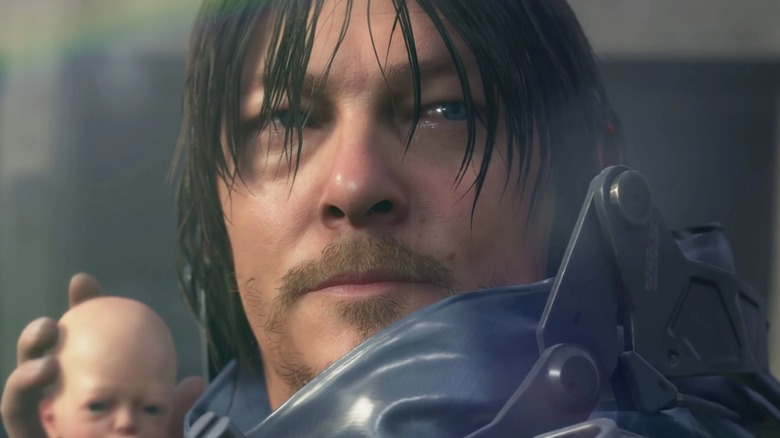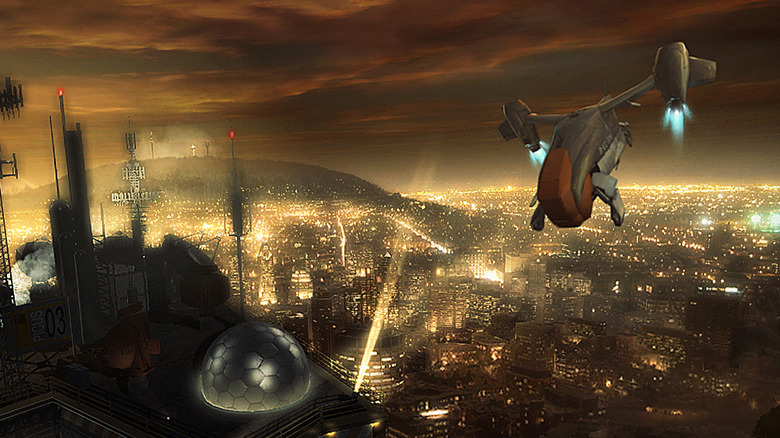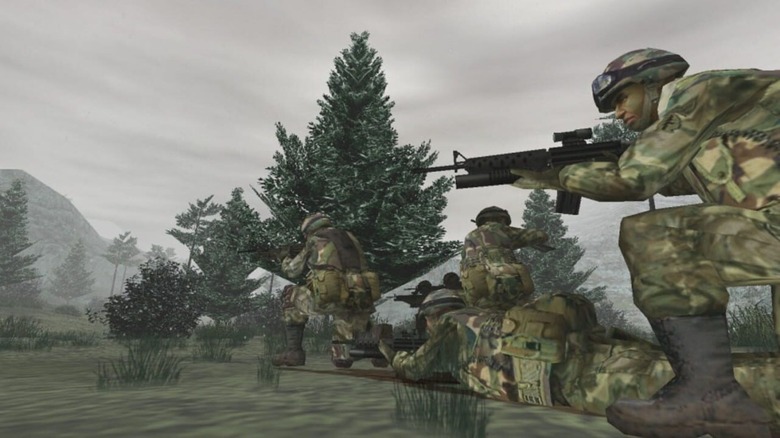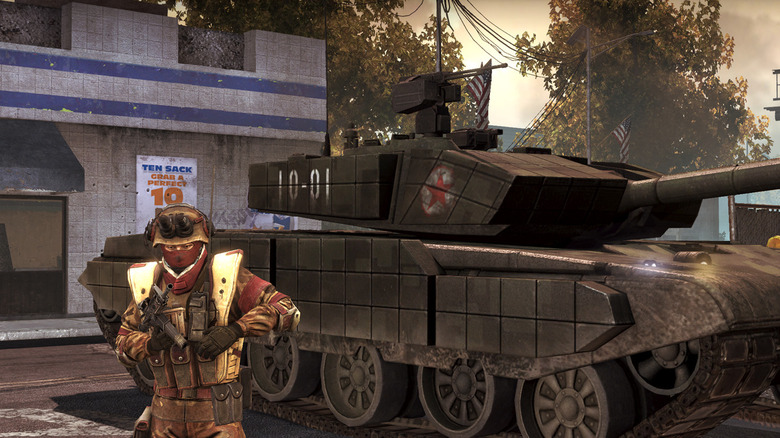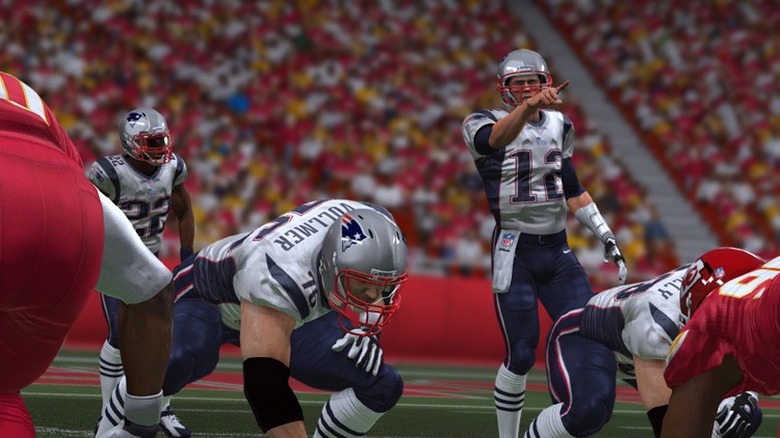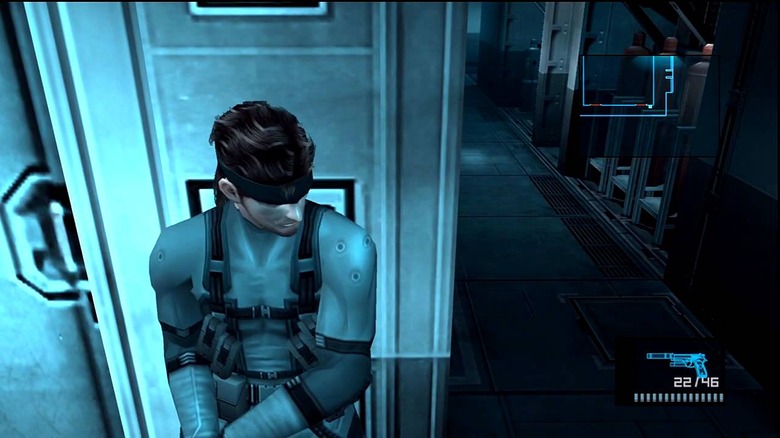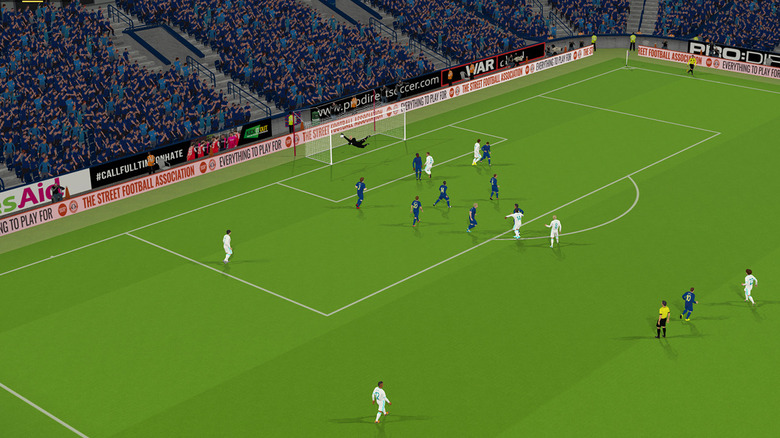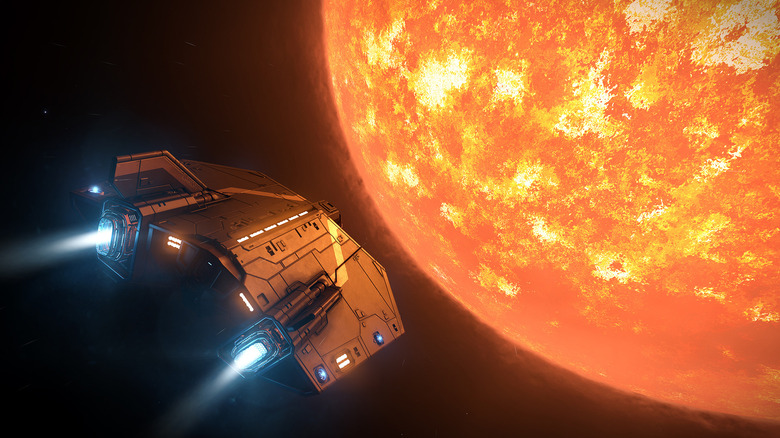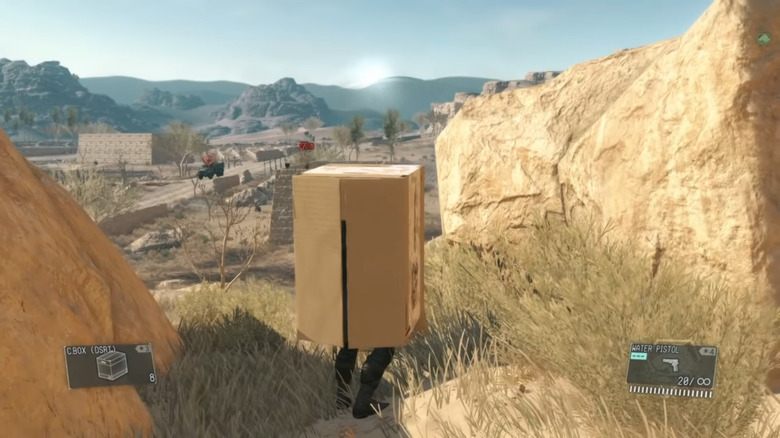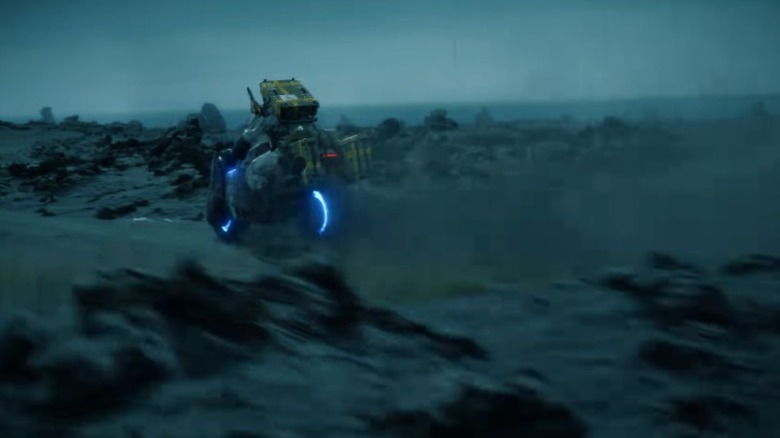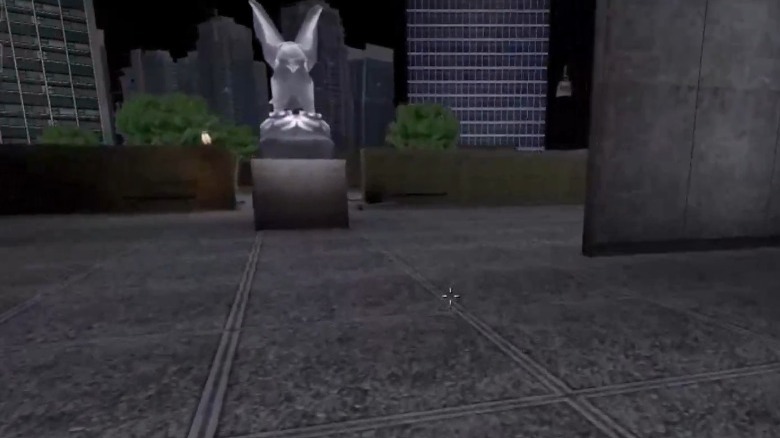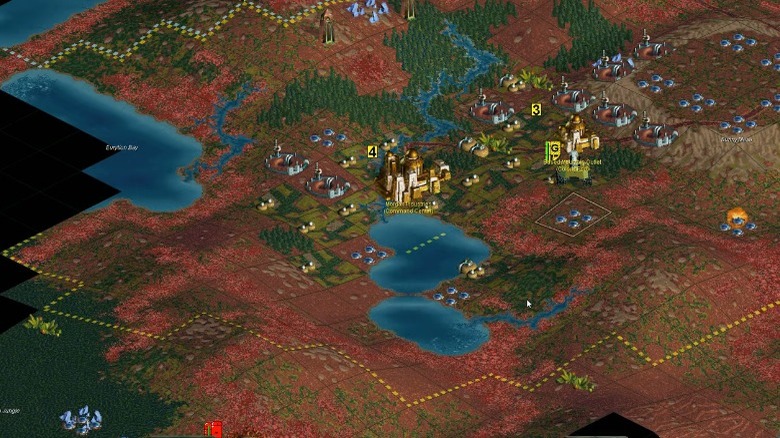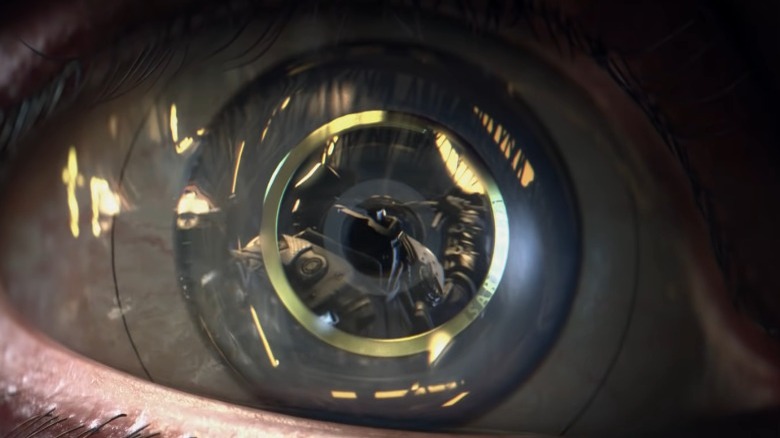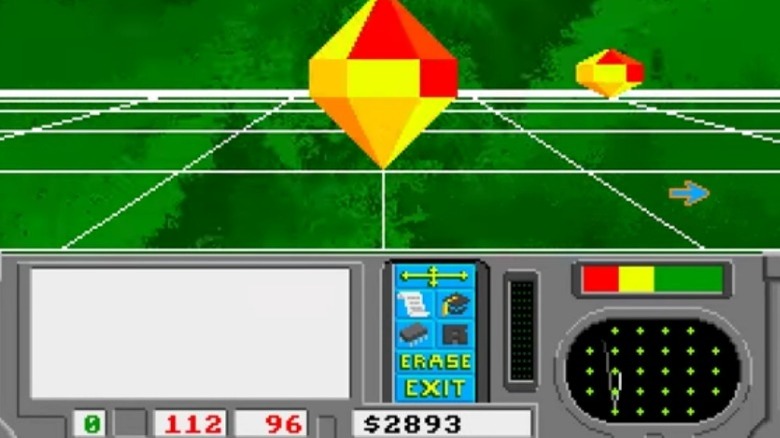Video Games That Eerily Predicted The Future
Even the tiniest video games need a good writer. A compelling story doesn't just spring out of nowhere, and writers for our favorite medium are not just responsible for the story. Kotaku spoke with a variety of writers, and they all echoed similar sentiments: video games are a huge collaboration, and writers are a part of that design team. This means that those writers have to come up with some interesting hooks to keep players going past the tutorial stage, and many popular genres overlap with the real world.
Many of these titles take place in the near-future, and for older games, that near-future may have already come to pass. Throw enough stories at the wall, and some of even the most outlandish predictions will come true. However, there are coincidences, and then there's just downright freaky. Today, we're going to take a look at some of the most bizarre cases of video games predicting the real-world future, sometimes to a frightening degree. It should serve as a tribute to writers out there: come see what magic these particular stories wove.
Deus Ex: Human Revolution predicted a political neophyte becoming the prime minister
"Deus Ex: Human Revolution" took on a difficult task: predict a real-world near future for a science-fiction story. You don't want to overextend and suggest all sorts of outlandish things happening in twenty years, but you also don't want to keep everything the same. Where's the fun in that? One of the most bizarre claims in "Human Revolution" centers on a young, relatively unknown (at the time) politician becoming the Prime Minister of Canada. A man by the name of Justin Trudeau.
The National Post wrote about Canada's Liberal Party circa 2011, the year "Human Revolution" released: they had just been destroyed in national polls, and it looked like there were going to be tough times ahead. Trudeau did not even gain leadership of his party until 2013, so it seems likely that this was a bit of a winking gag when the player discovers the information buried in some in-game text. Either that, or the developers at Eidos had some sort of glimpse into the future. If so, prepare for some shake-up on the world stage: the game also predicts that Canada will overtake the United States' economy by then.
Tom Clancy's Ghost Recon predicted an invasion almost a decade before it happened
Games based around military conflict are bound to get it right eventually: there's only so many countries out there with genuine, believable tension, so they're sometimes going to hit the jackpot. Even then, sometimes predictions are so spot on that they make you wonder just what the writer knew as they were putting things together.
Endgadget wrote that "Tom Clancy's Ghost Recon" did just that in 2001, missing the mark only by about three months. The first level sees you controlling US special forces as Russia invades the country Georgia. Seven years later, Russia invaded Georgia, which the Wall Street Journal said was its first conventional military attack against a neighboring nation since it invaded Afghanistan in 1979.
Similar to the game, Russia's forces completely dwarfed what Georgia could muster: the same WSJ article reported that 200 Russian airplanes were deployed, while Georgia's entire Air Force had fewer than a dozen planes. As far as we know, there were no super soldiers with infinite lives deployed to the conflict.
Metal Gear 2: Solid Snake predicted that algae would become fuel
The "Metal Gear" games have plenty of bonkers plot details: for example, how is a team of supersoldiers' most difficult boss a guy in a bomb suit wearing roller skates? But sometimes, "Metal Gear" gets some of its "out there" plots correct, like the central idea of "Metal Gear 2: Solid Snake".
"Metal Gear 2" came out in 1990, and Kotaku clarified that it is set later in the decade. In the game's plot, a major oil crisis has devastated the world economy, and the world has turned to algae as an alternative fuel source. Although algae hasn't surpassed oil as a fuel source in the real world, using it as energy isn't just some scientific dream scenario, either. In 2012, SF Gate reported that certain stations in the bay area began selling fuel made from algae that significantly decreased automobile emissions. And, as you'll see, Solid Snake isn't done predicting the future.
Metal Gear Rising: Revengeance predicted a familiar sounding political slogan
Back to "Metal Gear"! This time, let's take a look at "Metal Gear Rising: Revengeance," a game with a completely awesome name and absolutely detestable villain. Senator Steven Armstrong is a power-hungry, warmongering psychopath who would be right at home ruining the lives of small town America in a Stephen King novel. He orchestrates an assassination attempt on the president, and he constantly whines about Americans lacking the backbone to do what's necessary to regain power. As highlighted by Kotaku, he also spouts the idea that he will "Make America Great Again."
"Metal Gear Rising: Revengeance" came out in 2013, long before the idea of Donald Trump actually winning the presidency began to coalesce. A huge part of Trump's rise to power stemmed from his ability to brand his political message, and "Make America Great Again" is right up there with "Lock Her Up" and "Build the Wall" as far as his catchy slogans go. God only knows if Trump is also full of nanomachines that make him impervious to physical damage.
Homefront missed a major political death by only a few weeks
This one is really freaky. "Homefront" predicted that the death of North Korean leader Kim Jong-il would lead the country into a series of aggressive military actions that culminate in an invasion of the United States. In "Homefront," Kim Jong-il dies in 2012. In real life, Kim Jong-il died on December 17, 2011. A few weeks later, and "Homefront" would have been spot on.
The game also predicted how the succession of leadership would play out: Kust like in real life, North Korean rule passed on to Kim Jong-il's third son, Kim Jong-un. As of this writing, Kim Jong-un has yet to launch any military invasions, instead engaging in Twitter wars with US President Donald Trump over the size of their respective "buttons" (via Vox).
Madden 15 nails the outcome of Super Bowl XLIX
Every year, EA Sports runs a simulation of the Super Bowl in that year's "Madden" game to see if it can accurately predict the winner. It's actually fairly accurate: In 2018, Forbes wrote that predictions had been correct ten out of fourteen times (this later became ten out of fifteen, as "Madden" incorrectly predicted that the New England Patriots would beat the Philadelphia Eagles that year). Predicting the winner of the Super Bowl happens fairly regularly. But getting practically everything right about a Super Bowl, like "Madden 15" did with Super Bowl XLIX, is pretty darn impressive.
Yahoo created a rundown of everything that the game predicted would happen that year when the Patriots played the Seattle Seahawks. The simulation predicted: who would score first (Patriots), who would win the MVP (Tom Brady), and the exact score (28-24). It even had the Patriots scoring at the last minute to win on a touchdown pass from Brady to Julian Edelman. About the only thing it didn't get right was how many yards Brady would throw for — and it only missed that mark by 27.
Metal Gear Solid 2 predicted everything wrong with our current society
Here's a scenario for you: A shady group of very powerful people have collected a massive amount of personal data from an entire population. They are using that data to manipulate everyone in it, mainly by targeting them with memes and fake news to keep them off balance and in the dark about what's really happening. If you think that sounds a lot like what occurred leading up to the 2016 election with Facebook and the Cambridge Analytica scandal, get yourself a cookie.
If you think that sounds like the exact plot to "Metal Gear Solid 2", get yourself a second cookie. GamesRadar+ drew a number of parallels between the two: The game predicts a world in which a person's digital history can be used to target specific misinformation directly to them, or even to drown out valid reports by flooding them with false ones. "MGS2" came out in 2001, and some of its warnings about the direction of the world are downright terrifying in their accuracy. Watch this video of an in-game conversation (again, from a title released in 2001) between protagonist Raiden and his superiors, and just imagine it in the news in the months following the 2016 election. Freaky.
The Football Manager series predicts future stars with excellent success
Living in the United States, it can be hard to realize just how huge the world (and business) of soccer is. One great example is Sega's "Football Manager" series. For those not in the know, they might just seem like boring sports games where you don't actually get to play the sports. However, the real-world player databases in the series are massive and scarily accurate: Some professional teams have even hired experts at the video game to coach their teams in real life.
If you're looking for some gambling advice, it turns out you could do worse than "Football Manager." Kotaku wrote about certain fans of the series returning to "Football Manager 2007" and going through the youngsters pool to see which players had the most in-game "promise," which measures their potential. You can check out the full list on Reddit, but some of the names are bona fide international superstars at this point: Luka Modric (who led Croatia to the World Cup final in 2018), Sergio Aguero, Gerard Pique, and Sergio Ramos are just a few who "Football Manager" thought could go on to much bigger things.
Elite: Dangerous's algorithm predicted a solar system before NASA discovered it in real life
Depending on how you look at it, this could be the most impressive instance on this list. "Elite: Dangerous" is a spacefaring game that has a procedurally generated universe: The developers created a series of rules for how the title would put together its galaxy, and, as players explore, it builds solar systems according to those rules. So, when NASA announced the discovery of the Trappist-1 system, it came as a surprise to the team behind "Elite: Dangerous." Its algorithm had created almost the exact same system in the game, and had even placed it at roughly the same position in relation to Earth.
The "Elite: Dangerous" developers add real-world discoveries to the title, and they went to do that for Trappist-1. Imagine their shock when they discovered the game had beaten them to the punch: Its algorithm had created a system of seven Earth-like planets roughly 40 light years from Earth, just like the real Trappist-1. All they had to do was rename it. It's not truly a prediction, but it shows what a good algorithm can do. It may not be long before offerings like "Elite: Dangerous" become the major way to explore the unexplorable.
Metal Gear Solid knew how futuristic stealth would work
"Metal Gear Solid" games always present an interesting mix of sci-fi concepts with everyday reality. Clones and giant robots are seamlessly woven into contemporary settings as players are forced to contend with various threats using some wildly imaginative stealth technology. There's all sorts of gear that players can use to complete missions in the series, but one particularly high-tech option is so useful it can single-handedly deliver victory after victory.
We're talking, of course, about the cardboard box. Watching characters in "Metal Gear Solid" fool countless enemies by hiding inside a box might be good for a laugh, but believe it or not Hideo Kojima actually managed to predict the future of high tech military stealth by making the box one of Snake's premium pieces of gear.
Paul Scharre's book "Four Battlegrounds: Power in the Age of Artificial Intelligence" delves into the ways AI will affect the future of everyday life and even warfare. In an excerpt shared on Twitter, Scharre explains how Marines managed to trick a combat AI by hiding in a box just like Solid Snake. The computer had been trained to identify humans moving upright, and that's all it could do. A few pieces of cardboard were enough to undo the smartest technology that humanity has yet invented.
Death Stranding got the pandemic right
Hideo Kojima didn't limit his future predicting powers to the world of "Metal Gear Solid." In November 2019, he released "Death Stranding," which ended up being one of the most darkly prescient games of all time when the Covid-19 pandemic hit not even six months later.
In the world of "Death Stranding," humanity has been pushed to its breaking point by the titular infection. Countless lives have been lost, and the world has become an inhospitable place, forcing people to remain indoors almost all the time. Players work as package couriers, delivering much needed supplies to isolated settlements.
While "Death Stranding" certainly takes things to a more intense, sci-fi level, its setting is still creepily reminiscent of our world during the pandemic lockdowns. Kojima explained to IGN that he hadn't intended on predicting the future with his game. Instead he said he looked at the modern world and, "I felt that it was becoming divided, and that people were becoming isolated."
Intentional or not, Kojima got the future right with "Death Stranding," and he has no desire to do it again. In another interview (via IGN), Kojima said that he rewrote "Death Stranding 2" after the pandemic happened because "I also didn't want to predict any more future."
Deus Ex accidentally predicted 9/11
Some video game predictions are eerie, and others are outright haunting. The first "Deus Ex," developed by Ion Storm, predicts a slew of changes that play out over the course of 50 years, but there's one background change that really stands out today. Several missions are set in New York City, and a quick glimpse of the skyline reveals that the Twin Towers are missing. The story makes a passing reference to the Towers being destroyed in a terrorist attack. Eidos Interactive published the game in June of 2000.
This prediction might seem supernaturally accurate, but the developers behind "Deus Ex" aren't psychic. They didn't even mean to make the prediction in the first place. Kotaku did a deep dive on the game in 2017 and came back with the real reason behind this chilling detail. It turns out that the Towers weren't purposefully excluded from the game at all. There wasn't enough memory to go around, so the developers created a very lightly detailed skyline for New York and threw in a quick line later to explain away one of the major omissions. This particular prediction is just an uncomfortable coincidence.
Sid Meier's Alpha Centauri mapped the Human Genome early
Some games take reality as a jumping-off point for their predictions and end up pretty close to the mark. "Sid Meier's Alpha Centauri" released in 1999 and introduced an exciting new twist to the "Civilization" formula. The game is set in the 22nd century, and players get to explore a whole new galaxy (literally) of technology, diplomacy, and exploration.
When it comes to the technology of "Alpha Centauri," there's one project in particular that's worth noting. The game contains some secret projects that players can choose to advance, and one is "The Human Genome Project." By mapping the human genome, a player's civilization can learn incredible details about their own species – and gain an extra talent for their bases.
The real life Human Genome Project officially began in 1990, almost a decade before the game debuted. By 1999, however, the Project was still a long ways away from fully understanding human DNA. Not quite as long as the developers of "Alpha Centauri" predicted, though. It didn't take another century for the Project to reach completion. The human genome was fully mapped by 2003.
Deus Ex nailed the dangers of human augmentation
Some stories just have a better grasp on the future than others, and at times "Deus Ex" seems to know exactly how real life is going to unfold. In the game's world, the line between human beings and machines has become incredibly blurry. People modify their bodies with technology for all kinds of benefits, but the series also highlights the risks involved in making those upgrades. In "Deus Ex: Mankind Divided," for example, Jensen discovers that experimental augmentations were added to his body for someone else's purposes. As powerful as some augmentations are, "Deus Ex" repeatedly shows players that there are plenty of good reasons for regular people to turn them down.
Bionic augmentations are now a part of everyday life for some people, but unfortunately the horrors that "Deus Ex" tried to warn us about have also become a reality. A company called Second Sight Medical Products makes retinal implants that can allow blind people to see the world around them (via IEEE Spectrum). The devices – called Argus I and Argus II – changed the lives of their users, but then something terrible happened. Second Sight discontinued the implants in 2019, and the company nearly went bankrupt a year later. With no further support or upgrades coming for them, anyone with an Argus implant will eventually have their device fail, and the only way to remove it is with surgery. "Deus Ex" was right — tech companies can't always deliver what they promise.
Neuromancer knew how important the internet would become
"Neuromancer" was one of the earliest games to speculate about the future, and it ended up being one of the most accurate. Based on William Gibson's 1984 novel of the same name, the game was developed by Interplay and released in 1988.
Set in the 2050s, "Neuromancer" features a world of stunning technological advances and rampant poverty. Players take control of a hacker who hangs out in the slums of a massive city, checking into cheap hotels and ordering drinks at a local bar. In the world of "Neuromancer," everything revolves around "cyberspace," a realm of pure information where data is exchanged between individuals and companies all around the world. In one way or another, everyone's life is tied up with what's happening online.
Considering that the late '80s were the era of dial-up internet and BBS messaging, the game's prediction that all communication would eventually move to "the net" seemed pretty dramatic. From the viewpoint in the 21st century, the game and the novel that preceded it might have actually undersold the extent to which the internet would become an important part of everyday life. What's even stranger is that cyberspace in "Neuromancer" is a 3D experience that functions like the VR worlds we're only beginning to see today. To say the game was ahead of its time is an understatement.

